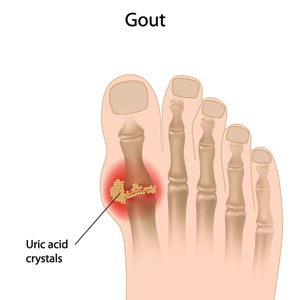
Urate is normally steadily excreted in the urine. In some people the mechanism to excrete the uric acid is defective.
These people are known as under-excretors, and constitute the majority of gout sufferers. This is aggravated by certain medications, especially diuretics and kidney disease. It occurs commonly in the setting of people with heart disease, obesity and diabetes and commonly in women who are post-menopausal who use diuretics.
Hyperuricaemia may also be caused by blood conditions such as lymphoma, leukaemia and haemolytic anaemia (where blood cells are destroyed), and by other cancers or psoriasis. In this situation the problem is over-production and the patients are called over-producers.
If urate levels in the blood rise too high (hyperuricaemia) the urate starts to crystallise as needle-like crystals in the joint fluid (synovial fluid) and joint lining (synovial lining). It forms deposits where the temperature is lower, as it is in the extremities, particularly around the big toe.
Some foods may contribute to high blood levels of urate. Marked rises in urate often follow overindulgence in high protein foods, especially if alcoholic beverages are also consumed. In most cases alcohol does not contain uric acid, but further prevents the excretion of uric acid via the kidneys.
Read: Is gout a chronic condition?
Urate can also form small, plate-like crystals in the kidneys, where they may aggregate to form gravel or stones.
Intense joint inflammation occurs when white blood cells engulf the crystals, causing pain and stiffness.
In order for this to occur there is often a precipitating event. Known precipitating factors for gout attacks include acute infection, emotional upset, the use of diuretic drugs such as Furosemide or Lasix, surgery and trauma.
In fact any “change” in the daily routine of a patient can precipitate an attack. This includes a food or alcohol binge. But even a new (especially high protein) reducing diet can aggravate the onset of an attack.
Read more:
All kinds of alcohol can bring on gout
Scientists discover 18 mutations that may cause gout
Previously reviewed by Dr David Gotlieb, rheumatologist, MBChB FCP(SA), September 2004
Reviewed by Dr Ingrid Louw, rheumatologist, MBChB, MMED Int Med, (private practice), August 2011




 Publications
Publications
 Partners
Partners















